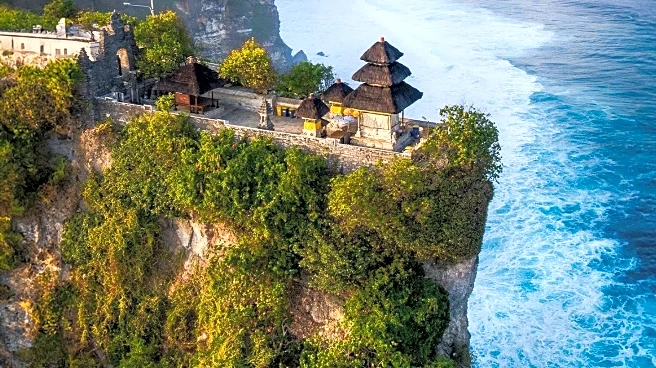What's Happening?
Bali, a popular tourist destination in Indonesia, is experiencing a significant increase in tourism, with projections indicating that the island will welcome over seven million foreign tourists this year. This surge in visitors has led to concerns about the island's changing character and environmental impact. The influx of tourists has resulted in increased congestion, pollution, and urban development, which have altered the island's traditional and natural landscapes. Local authorities have announced plans to restrict new construction in response to these challenges, but many believe these measures are insufficient. The island's popularity has been fueled by social media, which often presents an idealized image of Bali, leading to disillusionment among some visitors who find the reality does not match their expectations.
Why It's Important?
The rapid growth in tourism in Bali highlights the broader challenges faced by popular tourist destinations worldwide, where the balance between economic benefits and environmental sustainability is increasingly difficult to maintain. The situation in Bali underscores the need for sustainable tourism practices that protect local cultures and environments while supporting economic growth. The island's reliance on tourism for economic stability means that any significant changes to tourism policies could have substantial impacts on local livelihoods. Additionally, the environmental degradation and cultural erosion observed in Bali could serve as a cautionary tale for other regions experiencing similar tourism pressures.
What's Next?
Local authorities in Bali are taking steps to address the negative impacts of tourism by implementing restrictions on new construction and promoting sustainable tourism practices. Efforts are underway to improve waste management and reduce pollution, including a ban on single-use plastics. Community-led initiatives, such as beach clean-ups and educational programs, are also being launched to encourage responsible tourism. The success of these measures will depend on the cooperation of tourists, local businesses, and government agencies. Continued monitoring and adaptation of policies will be necessary to ensure that Bali can maintain its cultural heritage and natural beauty while accommodating the growing number of visitors.
Beyond the Headlines
The situation in Bali raises important ethical questions about the responsibilities of tourists and the tourism industry in preserving cultural and environmental integrity. The island's experience highlights the potential for tourism to contribute to cultural homogenization and environmental degradation if not managed carefully. It also emphasizes the importance of community involvement in tourism planning and the need for policies that prioritize long-term sustainability over short-term economic gains. As Bali navigates these challenges, it may serve as a model for other destinations seeking to balance tourism growth with cultural and environmental preservation.








